How to Choose the Right MBA in London

Choosing an MBA is a major decision that affects your finances, career path, and personal goals.
With London home to some of the world’s top business schools and career opportunities, the city provides access to diverse MBA formats—from intensive full-time programmes to flexible executive options—each designed to meet different professional goals and circumstances.
This guide will help you find an MBA in London that suits your career objectives, learning preferences, and budget.

Table of Contents
- Why London is a Great City for Your MBA Studies
- Types of MBA Programmes in London
- Key Factors to Consider When Choosing an MBA
- Great Choices for an MBA in London
- Making Your Final Decision
- Choose LIS: Your Path to Interdisciplinary Leadership
Why London Is a Great City for Your MBA Studies
London is a strong choice for pursuing an MBA because it combines academic depth with day-to-day access to real business environments.
The city’s global status means you’re learning in the same space where businesses are negotiating deals, launching new ideas, and leading across industries.
Global Business and Career Opportunities
London connects Europe, Asia, and the Americas, making it one of the most globally active business cities in the world. From banks and consultancies to climate tech firms and creative startups, there’s no shortage of industries to explore.
McKinsey, BCG, Bain, and other global consultancies recruit heavily in the city. London’s financial services sector employs more than 400,000 people. Its tech scene is also booming, producing more unicorn startups than any other European city.
International Student Network and Cultural Exposure
London’s MBA classrooms are diverse and globally focused. You’ll work alongside peers from different countries and industries, helping you build a truly international network.
But it’s not just about business. London gives you access to world-class museums, food, festivals, and neighbourhoods representing every continent. This exposure builds cultural intelligence that’s essential for global leadership.
Proximity to Employers and Startups
In London, you’re not studying near opportunity—you’re in it. MBA programmes here often include real-world consulting projects, guest speakers from industry, and partnerships with startups or corporate HQs.
From accelerators in Shoreditch to finance firms in the City, London puts you close to the organisations shaping today’s business world.
Types of MBA Programmes in London
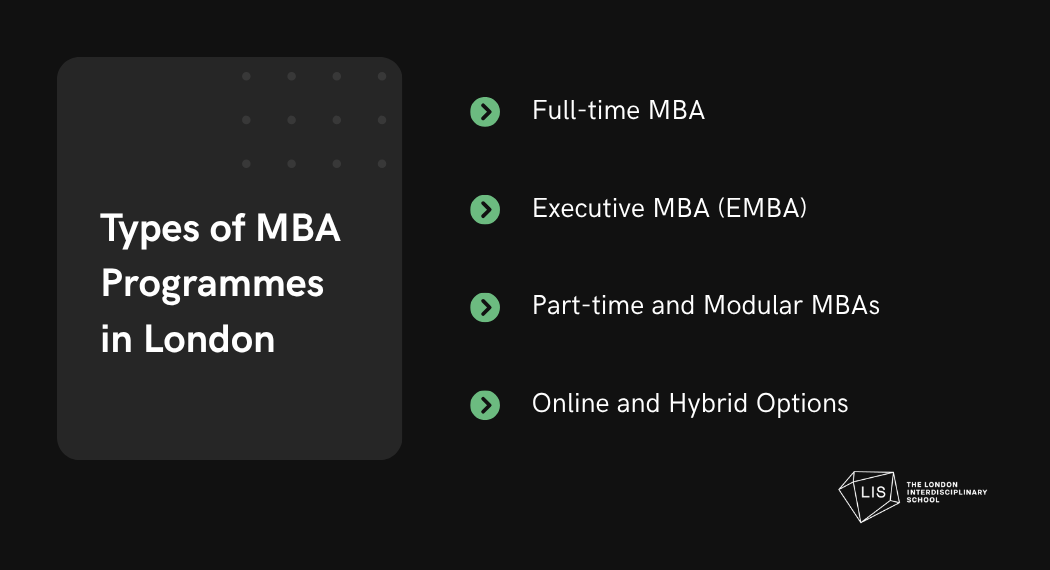
London's business schools offer MBA programmes in various formats to suit different professional circumstances and career goals.
Understanding these options is crucial for making the right choice for your situation.
Full-time MBA
This is the most immersive MBA programme. You’ll typically study full-time for 12 to 18 months, pausing your career to focus on learning, networking, and personal growth.
Best suited for: Early- to mid-career professionals who want to make a bold move, whether that’s changing sectors or accelerating progression.
Key benefits:
- Deep academic focus
- Daily interaction with faculty and peers
- Access to international exchanges and internships
- Strong post-MBA salary growth
- Development of practical skills through hands-on case studies, consulting projects, and team-based problem solving
Things to note: A full-time MBA requires significant financial investment and career interruption, making it most suitable for professionals with sufficient savings or strong post-graduation employment prospects.
Executive MBA (EMBA)
Designed for senior professionals, EMBA programmes run over 18 to 24 months with classes often on weekends or in intensive blocks.
Best suited for: Senior professionals with 10+ years of experience who want to advance their leadership skills while maintaining their current roles.
Key benefits:
- Apply learning directly to your job
- Learn alongside other experienced professionals
- Focus on leadership, strategy, and decision-making
- Some employers provide sponsorship
Things to note: An executive MBA requires exceptional time management skills and typically costs more than full-time programmes due to extended duration and format.
Part-time and Modular MBAs
Part-time MBA programmes typically span 2-3 years, with evening or weekend classes often complemented by intensive modules or residential components.
Best suited for: Working professionals who want to maintain their careers while pursuing business education with maximum flexibility in their schedule.
Key benefits:
- Maintain income while studying
- Lower opportunity cost
- Expand your network gradually
- Immediate application of new skills
Things to note: The extended timeline requires commitment and discipline to balance work, study, and personal responsibilities.
Online and Hybrid Options
Online and hybrid programmes combine sophisticated virtual learning with strategic in-person experiences, maintaining rigour while offering unprecedented flexibility.
Best suited for: Professionals requiring geographical flexibility or those whose work involves significant travel, including international students.
Key benefits:
- Learn from anywhere
- Lower total costs
- Flexible timelines
- Access to advanced digital learning tools
Things to note: Requires strong self-discipline and digital literacy, and networking opportunities may be more limited compared to traditional formats.
Key Factors to Consider When Choosing an MBA
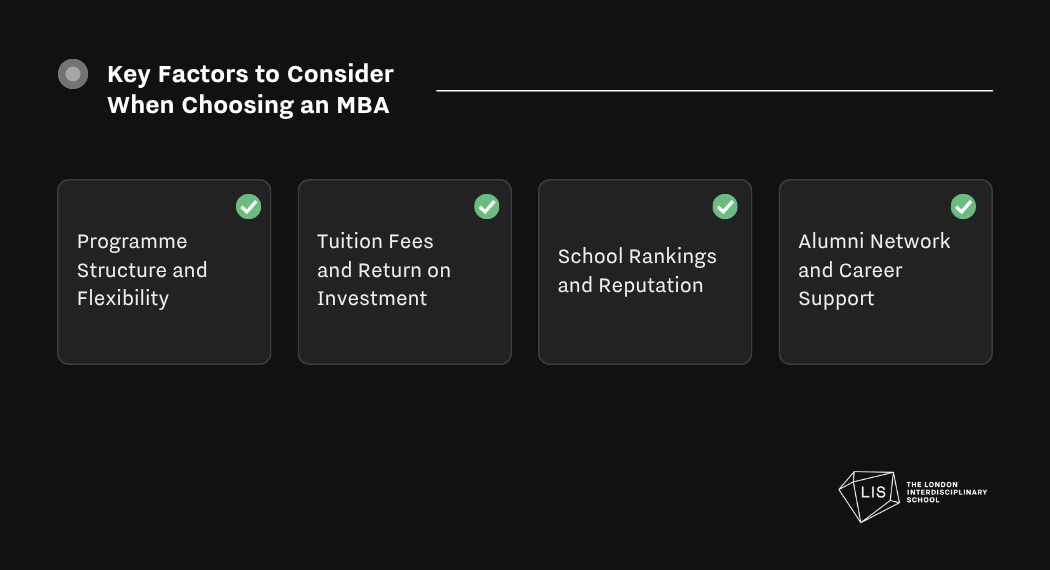
Selecting the right MBA programme requires careful evaluation of multiple factors that will impact both your learning experience and career outcomes.
Programme Structure and Flexibility
Start with your lifestyle and commitments. Can you step away from work for a year? Or do you need to keep earning while you study?
Take a look at how flexible the curriculum is for your preferred MBA option. Some programmes are highly structured, while others let you tailor your focus through electives or project work. Some also offer international modules, hybrid formats, and practical business challenges, allowing for greater flexibility.
Tuition Fees and Return on Investment
MBA programmes are significant financial investments, with tuition fees ranging from £30,000 to over £100,000 for top-tier programmes. And that’s not to mention the living expenses, potential lost earnings, and optional extras like global study trips.
You need to weigh the full cost against career outcome – for example, some sectors (like consulting and finance) offer faster salary growth, and might be worth the short-term financial impact. In some cases, scholarships and corporate sponsorships can help reduce your financial load.
Rankings and Reputation
Rankings can give you an initial idea of programme quality, but they don’t tell the whole story.
Different ranking systems emphasise different factors. Some prioritise graduate salary increases, others focus on academic research quality or international diversity. Industry reputation often matters as much as academic rankings, and some programmes have strong relationships with specific sectors or geographical regions.
Pay attention to a school or university’s strengths in your target field. Some excel in entrepreneurship, others in public sector leadership or sustainability. The best option is the one that aligns with your goals.
Alumni Network and Career Support
The strength and engagement of the faculty’s alumni network should be a consideration. Large, active networks can provide ongoing professional opportunities, mentorship, and business connections long after you’ve completed your studies.
It’s important to evaluate the career services and post-graduation support offered by any MBA. Top programmes provide dedicated career coaches, industry-specific workshops, and ongoing career assistance for alumni. Look for programmes with strong placement rates in your target industry and evidence of successful career transitions for students with backgrounds similar to yours.
Look at the quality of corporate relationships and recruitment partnerships. Programmes that have established relationships with target employers often provide insider access to opportunities and application processes. Some schools guarantee interviews with key corporate partners, improving job search prospects.
Great Choices for an MBA in London
London is home to several world-renowned business schools, each with its distinct strengths and characteristics.
Here's an overview of some of the leading institutions and their unique value propositions.
LIS MBA (London Interdisciplinary School)
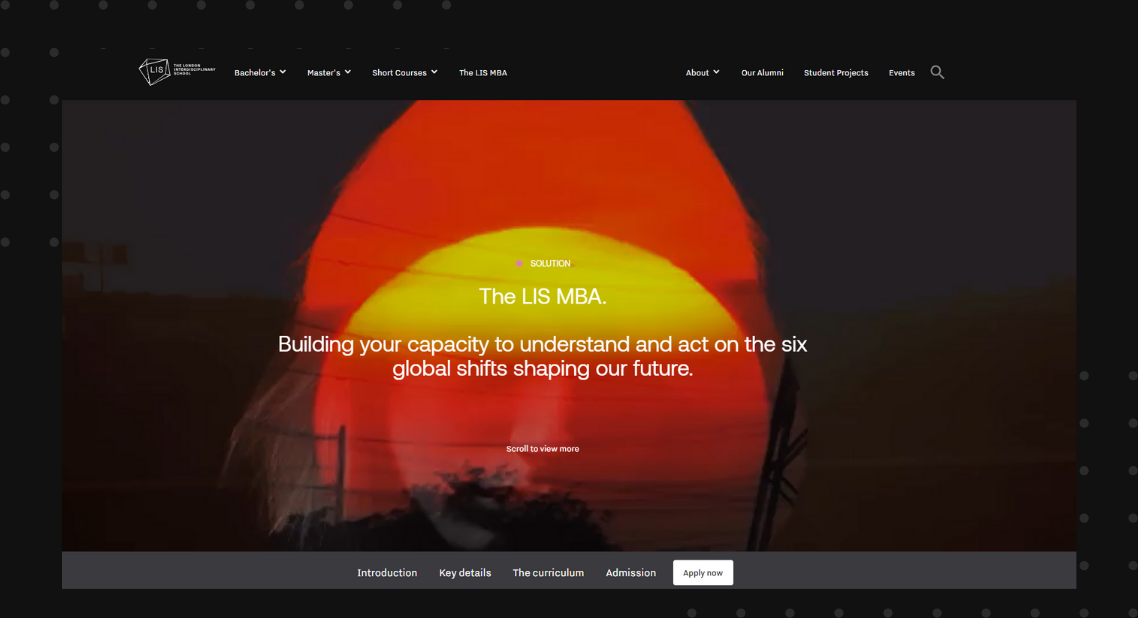
The London Interdisciplinary School takes a new approach to business education through its innovative MBA programme. Its focus is on interdisciplinary thinking and complex problem-solving skills.
LIS empowers students to tackle social and global issues head-on, preparing future leaders for an interconnected world where traditional business boundaries are increasingly irrelevant.
Key curriculum:
- Complexity management and systems thinking methodology
- Cross-functional leadership and behavioural science integration
- Technology ethics and digital transformation strategies
- Sustainability and social impact business models
- Work on live cases with industry partners, providing real-world experience
Tuition fees: The LIS MBA costs 30,000. Please contact LIS directly for scholarship information. Our flexible admissions process looks at diverse backgrounds beyond traditional qualifications.
London Business School MBA
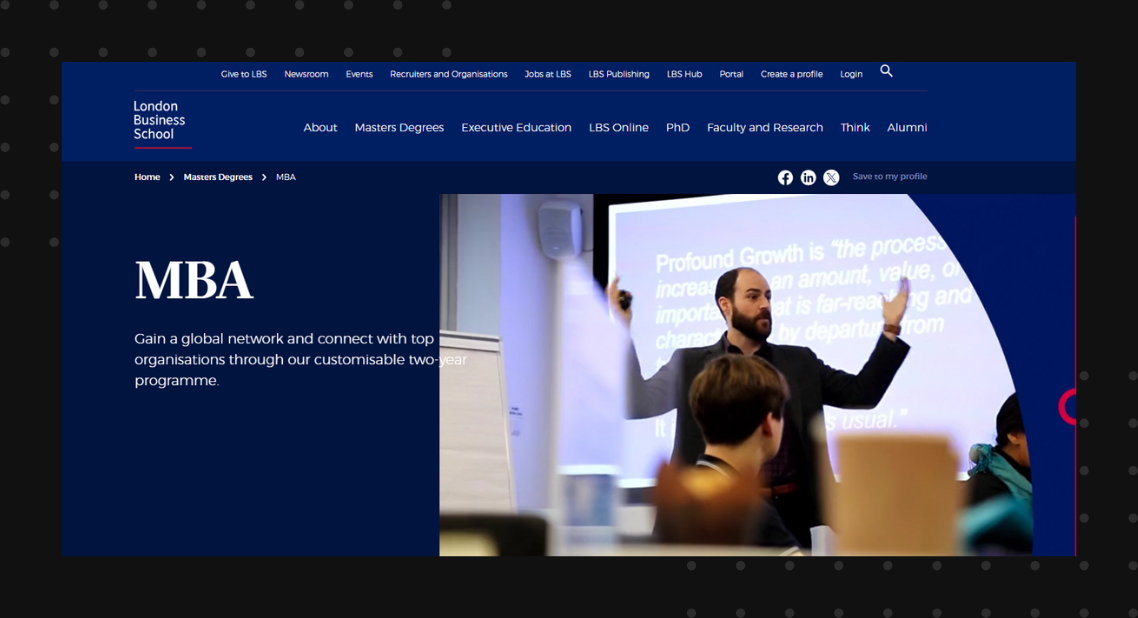
The London Business School ranks among the world's top MBA programmes. It’s renowned for academic rigour, a diverse student body, and career outcomes in finance and consulting.
Key curriculum:
- Advanced financial markets and investment strategies
- Global business strategy and international management
- Entrepreneurship and innovation management
- Leadership development and organisational behaviour
- Extensive case study methodology and consulting projects
Tuition fees: Approximately £115,000 for the full-time MBA (though merit-based scholarships are available).
Imperial Business School MBA
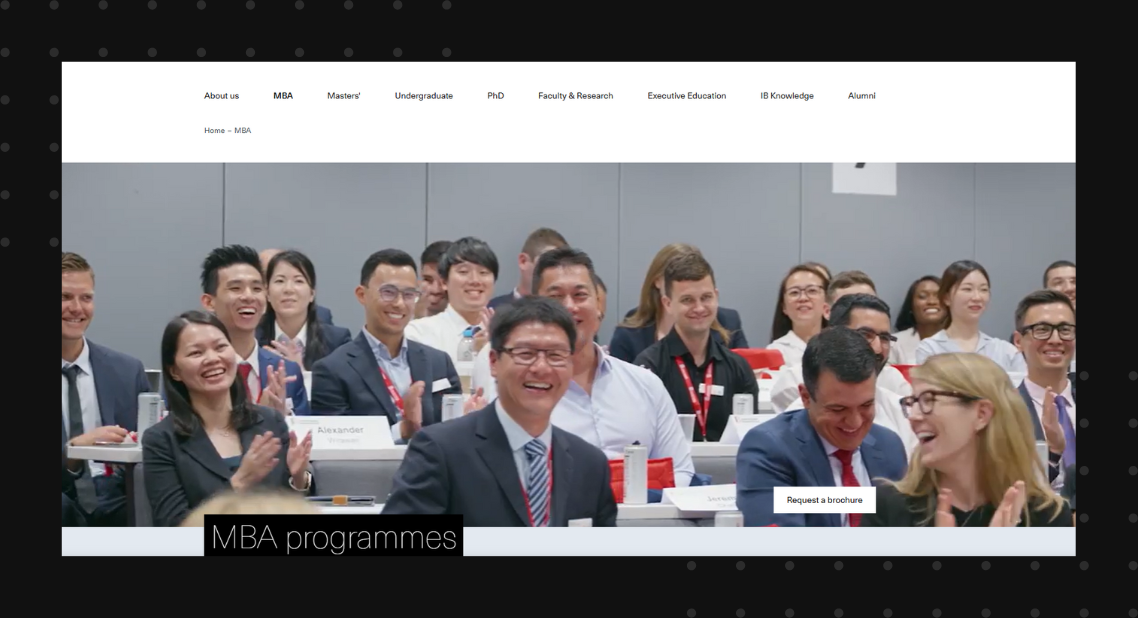
The Imperial College Business School leverages world-renowned expertise in science and technology to offer an MBA programme with a focus on innovation and technology management.
Key curriculum:
- Data-driven decision making and analytics
- Digital transformation and emerging technologies
- Healthcare and energy sector specialisation
- Engineering-business interface projects
Tuition fees: Approximately £69,900 for full-time MBA, with scholarships for outstanding candidates.
Bayes Business School MBA
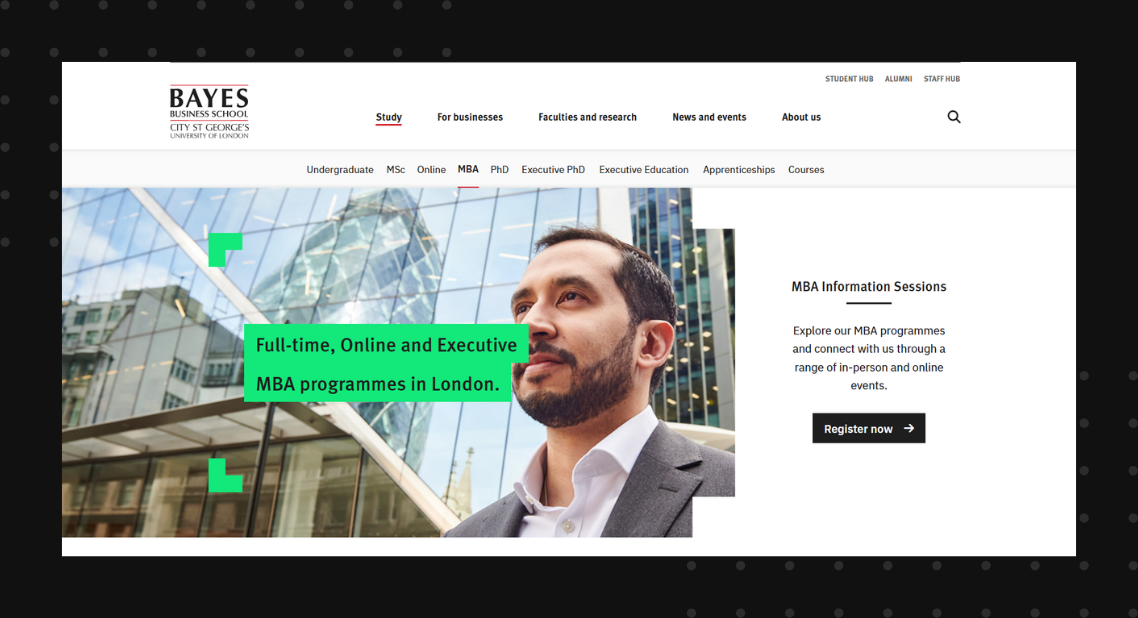
Bayes Business School offers MBA programmes with a strong focus on finance, insurance, and quantitative analysis, reflecting its heritage within London's financial district.
Key curriculum:
- Advanced quantitative analysis and risk management
- Financial markets and banking specialisations
- Insurance and actuarial science applications
- Fintech and financial innovation
- City of London industry connections and projects
Tuition fees: Approximately £52,500 for the full-time MBA, with opportunities for corporate sponsorship available.
King's College London Executive MBA
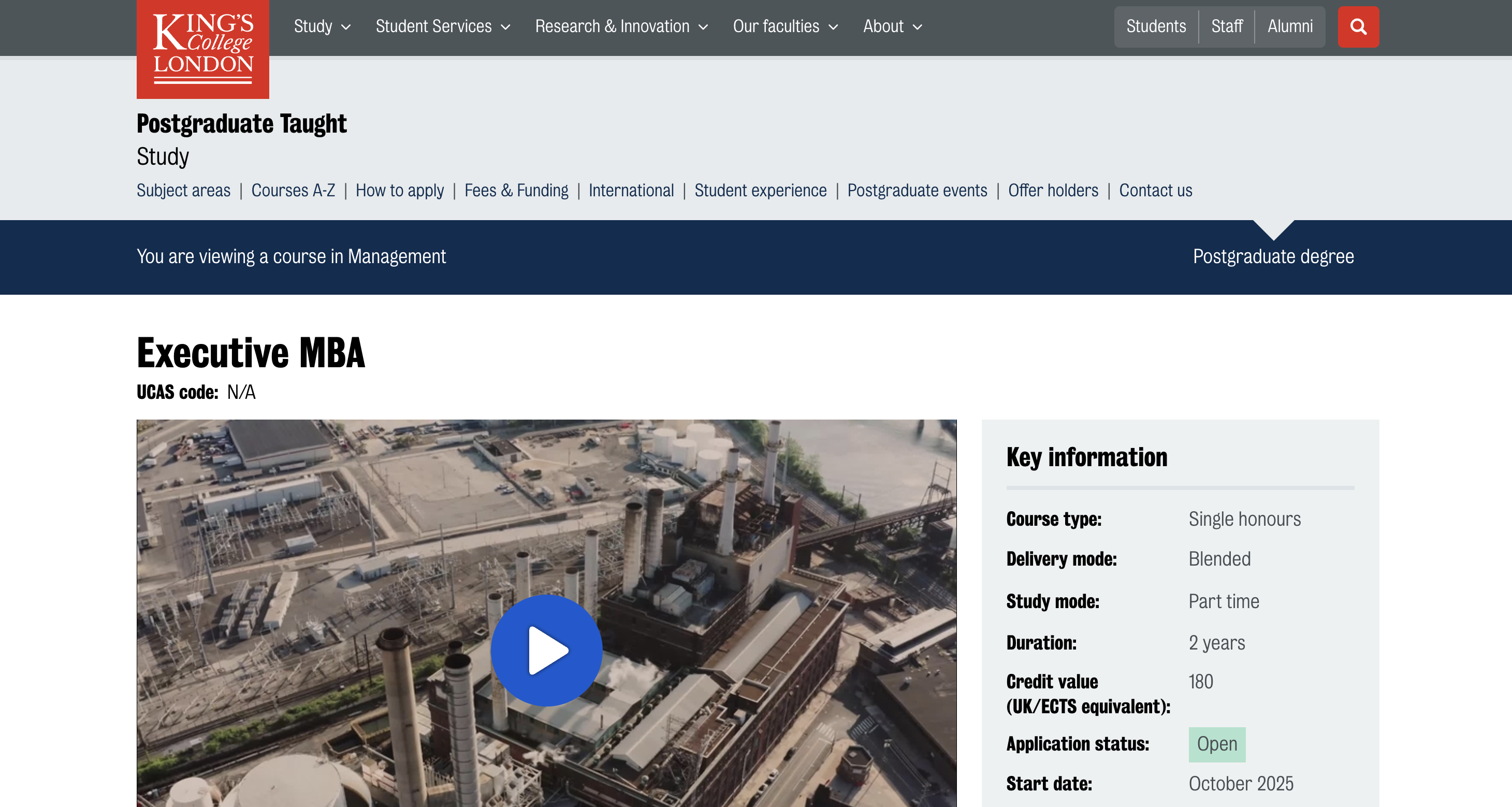
King's College London Business School combines academic excellence with an emphasis on responsible business and social impact, leveraging the university's broader academic community.
Key curriculum:
- Responsible business and sustainability leadership
- Healthcare and public sector management
- Social entrepreneurship and impact investing
- Policy analysis and government relations
- Cross-disciplinary collaboration with university departments
Tuition fees: Approximately £46,800 for full-time MBA, with competitive scholarship programmes.
Making Your Final Decision
Choosing the right MBA programme requires an evaluation of your options against your specific goals and circumstances.
Here's a framework to help you make your final decision.
Matching Programs to Your Goals
It’s key that your MBA of choice will actually help you meet your goals, whether they are personal or professional. Some questions you can ask yourself include;
- What do you want your MBA to do for you? Are you trying to advance in your current industry, transition into a new one, or start something of your own?
- How do you learn? Do you want structure or flexibility? A fast-paced experience or something more gradual?
- Do the school’s values align with yours? Some lean into competition and rankings. Others, like LIS, are built around solving complex problems and leading across sectors.
Application Tips and Timelines
Most MBA programmes have multiple application deadlines throughout the year, with earlier rounds often offering better scholarship opportunities and admission chances. Research specific deadlines for your target programmes and allow time for GMAT/GRE preparation if required.
Write clear application essays that explain your career goals and why each programme fits your objectives. It’s always best to use specific examples from your work experience to show leadership potential and professional skills.
Finally, get strong recommendation letters from managers who know your work well. Brief them on your goals so they can write targeted, supportive letters that align with your objectives.
Final Checklist Before Applying
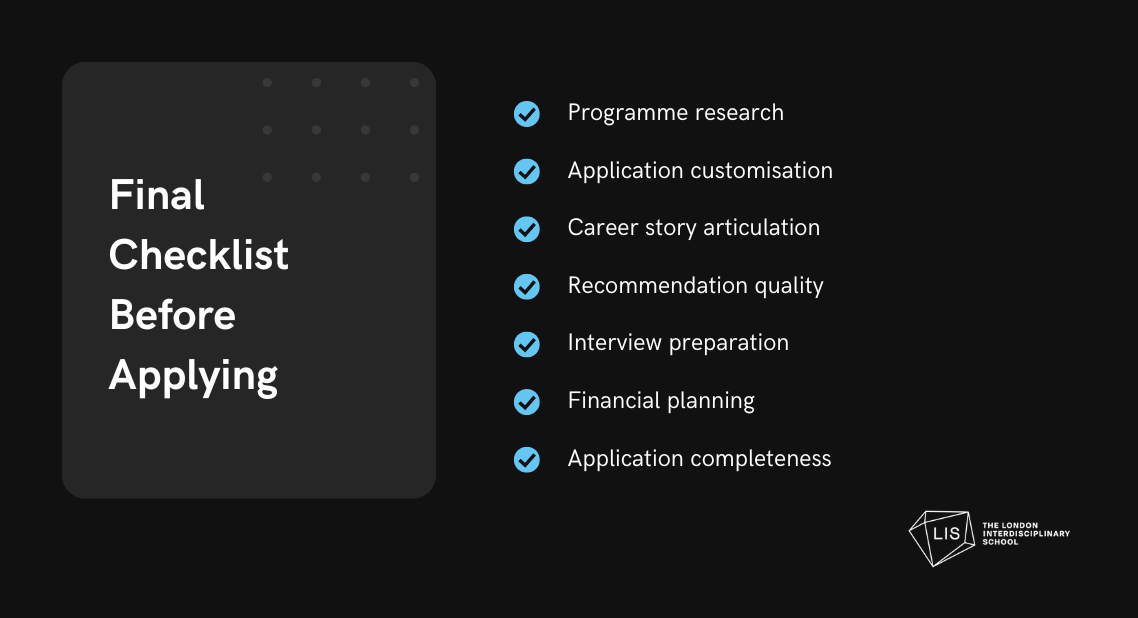
Before submitting applications for an MBA in London, ensure you've completed thorough research and preparation to maximise your chances of admission and programme fit.
- Programme research: Attend information sessions, speak with current students and alumni, visit campuses when possible
- Application customisation: Tailor essays and materials to reflect understanding of each school's unique strengths
- Career story articulation: Practice explaining your career progression, MBA motivation, and specific interest in each programme
- Recommendation quality: Secure strong letters from supervisors who can speak to your leadership potential and achievements
- Interview preparation: Research current business trends and prepare to discuss your contribution to classroom discussions
- Financial planning: Confirm funding arrangements, scholarship applications, and total cost calculations
- Application completeness: Verify all required documents, test scores, and deadlines are met
If you’re looking to apply to LIS, we’ve put together a handy guide to help you bring your experience and perspective to life.
Choose LIS: Your Path to Interdisciplinary Leadership
If you’re looking for an MBA that prepares you to lead in uncertain, fast-changing environments, the London Interdisciplinary School offers a unique model.
The LIS MBA develops the skills necessary to solve real-world problems—working across disciplines, engaging with complexity, and adopting a systems-level view of business. You’ll work on real-world industry projects, collaborate across sectors, and learn from academic and industry leaders who are tackling today’s most urgent challenges.
Whether you're pivoting careers, scaling a new idea, or seeking to lead with purpose, LIS provides the training, support, and network to help you succeed.
Share this story
Sign up for our newsletter
Don't miss out on important updates including course information, new announcements, Open Day dates and the latest LIS news.











































.svg)

.svg)









.webp)
This is a comment related to the post above. It was submitted in a form, formatted by Make, and then approved by an admin. After getting approved, it was sent to Webflow and stored in a rich text field.